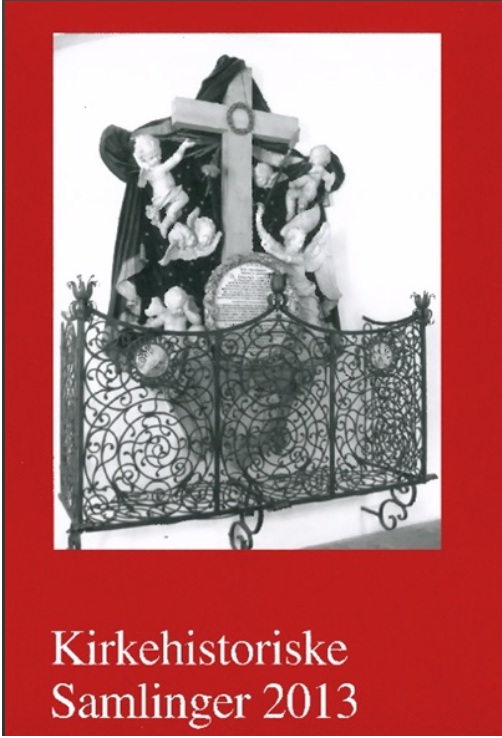Publiceret 15.12.2013
Citation/Eksport
Copyright (c) 2013 Tidsskriftet Kirkehistoriske Samlinger

Dette værk er under følgende licens Creative Commons Navngivelse – Ingen bearbejdelser (by-nd).
Resumé
Denne artikel sætter fokus på grundlovskomitéen, der blev nedsat af Den grundlovgivende Rigsforsamling 1848-49. Komitéen, som var domineret af jurister, havde til opgave at give sin indstilling til Rigsforsamlingen vedrørende regeringens grundlovsudkast. Debatten og afstemningerne om kirke- og religionsparagrafferne i Rigsforsamlingen viste, at komitéen fik hovedparten af sine forslag igennem, og det til trods for de mange ændringsforslag. Komitéen havde forhandlet sig frem til sine forslag bl.a. på grundlag af regeringsudkastets og Københavns gejstlige Konvents anbefalinger. Artiklen vil undersøge grundlovskomitéens virke i den politiske proces med hensyn til kirke- og religionsparagrafferne, fordi det har været underbelyst. Undersøgelsens resultat er en understregning af komitéens aktive formidlerrolle i den politiske proces. Det betyder en revision af kirkeretshistorikeren H.J.H. Glædemarks opfattelse, der underspiller komitéens selvstændighed. Et klart eksempel på denne aktive formidlerrolle er komitéens sideordnede opstilling af de to løfteparagraffer om henholdsvis Folkekirkens kirkeforfatning og en lov for andre trossamfund. Dette har Glædemark ikke lagt afgørende vægt på, men det vil ske i denne artikel. Derved gives et bidrag til de to løfteparagraffers tilblivelse.
Summary
This article focuses on the constitutional committee appointed by the Constitutional Assembly 1848-49. Consisting mainly of jurists, the
committee was made recommendations on the adoption of the government’s draft constitution. The debate and the votes in the Assembly concerning the articles on the national Church and religious communities show that – in spite of many proposed amendments – most of the committee’s proposals were passed. Governmental draft resolution and recommendations from Copenhagen’s clerical Conventions laid the groundwork for the committee. A member of the committee the vicar J.C. Schurmann made a very positive contribution.
The constitutional committee played an important and crucial part in the political process concerning articles on the Church and articles on religion. The church historian H.J.H. Glædemark underestimates the role played by the constitutional committee. Glædemark does not put emphasis on the committee’s parallel position of two articles that contain promises regarding a constitution for the Danish national Church (article 64 of the report; the existing law, article 66) as well as an article on other religious communities (article 66 b of the report; the existing law, article 69). The committee formulated a separate article on other religious communities outside the national Church. In the committee debates on a representative constitution for the Church also took place, but no demand for a separation of State and Church was expressed. The Constitutional Assembly did not adopt the entire article 64 on a constitution
for the Church because the majority of the Assembly neglected the last part of the article dealing with a preceding church meeting.
The committee members’ attitudes intended to have the two articles of promises passed immediately after the adoption of the Constitution 1849.
The committee formulated on its own initiative articles on the release from parish bond (sognebåndsløsning) – a minority recommended the adoption of a proposal (article 64 b) – as well as on church property (article 66 d). These articles were not adopted by the Assembly. The liberal theologian H.N. Clausen was a minister in the government. He took part in the committee negotiations. In an important meeting he probably tried to influence on the committee’s proposal concerning the article on a church constitution and particularly on church property. Only the promise of a constitution for the Church remained, and still
exists.
The committee made other recommendations based on the formulations of the governmental draft. The committee made some editorial alterations (articles 2, 65, 66, 66 c of the report; the existing law, articles 4, 67, 68, 70). The sentence on citizens’ duties was added by the committee. It relates to the article on citizens’ civil rights and duties regardless of creed (article 66 c of the report).
All things considered, the leading principles of the committee’s recommendation were adopted by the Constitutional Assembly’s wideranging debates. The fundamental attitude emphasized the preferential position of the national Church in connection with all of the articles concerning Church and religion.

